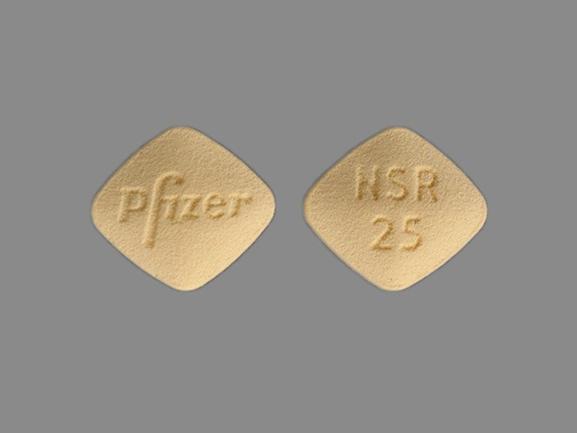Inspra Disease Interactions
There are 4 disease interactions with Inspra (eplerenone).
Eplerenone (applies to Inspra) diabetes type II and microalbuminuria
Major Potential Hazard, High plausibility. Applicable conditions: Diabetes Type 2
The use of eplerenone is contraindicated in patients with type II diabetes mellitus and microalbuminuria. These patients are at increased risk of developing persistent hyperkalemia, which is the principal adverse effect of eplerenone and can lead to potentially life-threatening cardiac arrhythmias. In a study of such patients treated with a 200 mg/day dose, the frequency of maximum serum potassium levels exceeding 5.5 mEq/L was 33% with eplerenone alone and 38% in combination with enalapril. In other patient populations, the frequency has been reported at 1% for the 200 mg/day dose and 8.7% for the 400 mg/day dose. Careful monitoring of serum potassium levels is necessary in patients treated with eplerenone who are at risk for the development of hyperkalemia, especially during initiation of therapy, after dosage adjustment, and during illness that could alter renal function. In clinical trials, monitoring occurred every 2 weeks for the first 1 to 2 months, then monthly thereafter. Eplerenone should be withdrawn immediately if hyperkalemia develops, and measures should be initiated to lower serum potassium if it exceeds 6.5 mEq/L.
Eplerenone (applies to Inspra) hyperkalemia
Major Potential Hazard, High plausibility.
The use of eplerenone is contraindicated in the presence of elevated serum potassium concentrations (> 5.5 mEq/L). Eplerenone is a blocker of aldosterone binding at the mineralocorticoid receptor and can cause hyperkalemia, which may result in life-threatening cardiac arrhythmias. Careful monitoring of serum potassium levels is necessary in patients who are at risk for the development of hyperkalemia (including those receiving concomitant ACE inhibitors or angiotensin II receptor antagonists), especially during initiation of therapy, after dosage adjustment, and during illness that could alter renal function. In clinical trials, monitoring occurred every 2 weeks for the first 1 to 2 months, then monthly thereafter. Eplerenone should be withdrawn immediately if hyperkalemia develops, and measures should be initiated to lower serum potassium if it exceeds 6.5 mEq/L.
Eplerenone (applies to Inspra) renal dysfunction
Major Potential Hazard, High plausibility.
The use of eplerenone is contraindicated in patients with renal impairment as defined by serum creatinine above 2.0 mg/dL for males or 1.8 mg/dL for females, or a creatinine clearance (CrCl) below 50 mL/min. These patients are at increased risk of developing persistent hyperkalemia, which is the principal adverse effect of eplerenone and can lead to potentially life-threatening cardiac arrhythmias. The incidence of hyperkalemia increases with decreasing renal function. In clinical studies of eplerenone, serum potassium levels exceeding 5.5 mEq/L were observed in 10.4% of treated patients with baseline calculated CrCl less than 70 mL/min, 5.6% of patients with baseline CrCl 70 to 100 mL/min, and 2.6% of patients with baseline CrCl greater than 100 mL/min. Careful monitoring of serum potassium levels is necessary in patients treated with eplerenone who are at risk for the development of hyperkalemia, especially during initiation of therapy, after dosage adjustment, and during illness that could alter renal function. In clinical trials, monitoring occurred every 2 weeks for the first 1 to 2 months, then monthly thereafter. Eplerenone should be withdrawn immediately if hyperkalemia develops, and measures should be initiated to lower serum potassium if it exceeds 6.5 mEq/L.
Eplerenone (applies to Inspra) liver disease
Moderate Potential Hazard, Moderate plausibility.
Eplerenone is primarily metabolized by the liver. In patients with moderate (Child-Pugh Class B) hepatic impairment given eplerenone 400 mg, the steady-state peak plasma concentration (Cmax) and systemic exposure (AUC) of eplerenone were increased by 3.6% and 42%, respectively, compared to those in normal subjects. In 16 patients with mild to moderate hepatic impairment who received 400 mg of eplerenone, no elevations in serum potassium above 5.5 mmol/L were observed. Their mean increase in serum potassium was 0.12 mEq/L compared to 0.13 mEq/L in normal controls. No adjustment of the starting dosage is recommended for patients with mild to moderate hepatic impairment. The use of eplerenone in patients with severe hepatic impairment has not been evaluated, thus caution is advised.
Switch to professional interaction data
Inspra drug interactions
There are 451 drug interactions with Inspra (eplerenone).
Inspra alcohol/food interactions
There are 2 alcohol/food interactions with Inspra (eplerenone).
More about Inspra (eplerenone)
- Inspra consumer information
- Check interactions
- Compare alternatives
- Pricing & coupons
- Reviews (2)
- Drug images
- Side effects
- Dosage information
- During pregnancy
- Generic availability
- Drug class: aldosterone receptor antagonists
- Breastfeeding
- En español
Related treatment guides
Drug Interaction Classification
| Highly clinically significant. Avoid combinations; the risk of the interaction outweighs the benefit. | |
| Moderately clinically significant. Usually avoid combinations; use it only under special circumstances. | |
| Minimally clinically significant. Minimize risk; assess risk and consider an alternative drug, take steps to circumvent the interaction risk and/or institute a monitoring plan. | |
| No interaction information available. |
See also:
Further information
Always consult your healthcare provider to ensure the information displayed on this page applies to your personal circumstances.


